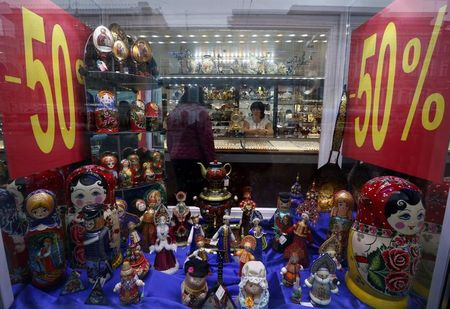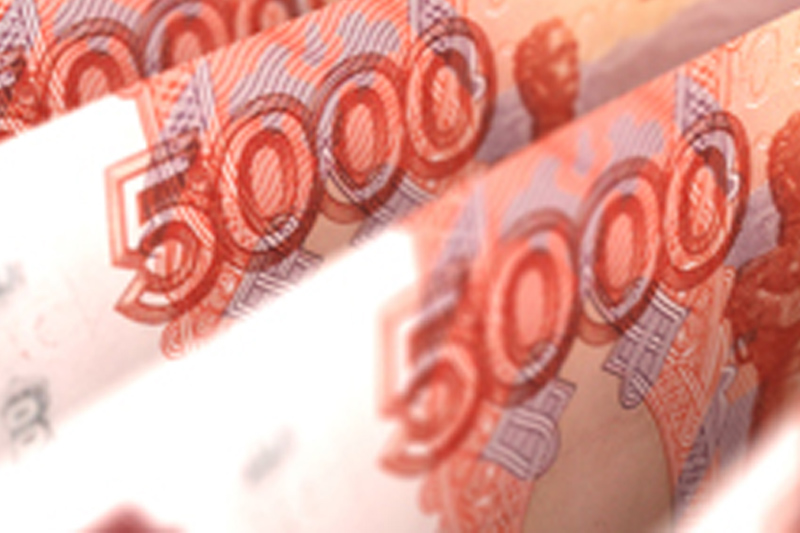By Elizabeth Piper MOSCOW (Reuters) - Alexander Shalin rides a bike to work, shops in local grocery stores and doesn't worry too much about fashion. The 37-year-old manager should be recession-proof, but even he is feeling the pinch from Russia's slowing economy.
To escape the "terrible" weather in Russia's second city of St Petersburg, Shalin takes as many foreign trips as he can, but now has started to "triple check" whether he can afford to since the rouble fell almost 30 percent against the dollar.
Shalin is one of many Russians whose lives are beginning to change as a combination of Western sanctions over Ukraine, a ban on some food imports and falling oil prices weigh on an already weakened economy, forcing the rouble down and prices up.
There is little panic in major cities and, as Shalin says, no fear of going hungry for white-collar workers. But more Russians are putting off expensive purchases, adapting their travel plans to the sun and changing to discount grocery stores to hunker down for many more months of living under sanctions.
"I don't think that the fall of the rouble will really affect my everyday life - I'm not going to starve or start walking to work, but it looks like the fun in my life will be diminished," said Shalin, who works at an Internet company, describing "the fun" as travel and buying new, hi-tech phones.
In an opinion poll published this week, 61 percent of respondents said they expected living standards to decline and foresaw an economic crisis in the near future. The survey showed 56 percent believed the main cause for this was Moscow's policies in Ukraine where it annexed Crimea in March and backs a separatist uprising in the east.
The United States and the European Union have imposed asset freezes and visa bans on some businessmen and put sanctions on some companies and banks, trying to persuade President Vladimir Putin to change tack.
A tit-for-tat Russian ban on dairy products, meat, vegetables and fruit from most Western countries has pushed up food prices, hitting consumers were it hurts most - in their pockets.
But while the ban annoys at least 90 percent of consumers, Mikhail Anshakov, head of the Society for the Protection of Consumers, said most were "willing to put up with it" to support Russia in the worst standoff with the West since the Cold War.
According to the Levada poll conducted late last month, 73 percent of Russians still support the import ban, slightly down from 78 percent in August. In another study published on Monday, 86 percent still back the reunification of Crimea and Russia.
WEATHERING THE CRISIS
Shalin says his food bill has increased by about 25 percent since the spring, and many Russians have turned to low-price grocery stores or cut back on what they put in their baskets.
The Federal Statistics Service said annual inflation exceeded 8 percent in October and food prices increased 11.5 percent. But certain products have risen faster; meat and poultry rose 18.2 percent while milk and dairy products were up more than 15 percent.
Russia's hypermarket chains are losing customers in a similar way to 2008, when the global financial crisis hit. Neighbourhood discounters are profiting.
"People are basically shopping more frequently in smaller format stores and buying less items as they go," Tony Maher, chief executive officer at hypermarket chain O'Key, said late last month as the company cut its revenue forecast for 2014.
Shoppers are also turning to Russian products, which, according to software engineer Dmitry Klekovkin, "are not bad, in fact much more tasty".
"Probably, the price for those products grew, but in general we still spend the same amount on groceries," he said, putting his family's monthly bill at around 15,000 rubles (205.61 pounds).
Hunting for bargains may also have helped Russia's cheap but often-derided Lada car, which unlike its leading foreign competitors posted an almost one percent sales increase in October compared with a year ago.
But mostly, Russian consumers are putting off bigger purchases and at least for now, postponing more exotic holidays to favourites such as Turkey, Egypt and Thailand without too many complaints - although that may all change after real wages declined last month for the first time this year.
"Somehow everything is OK. Incomes are rising and I don't really analyse spending," said Artur Trofimov who lives in Russia's far east. "As for expensive products, well so what?"
(Additional reporting by Maria Kiselyova, Alexander Winning and Gleb Stolyarov, editing by Timothy Heritage and David Stamp) urn:newsml:onlinereport.com:201
By Elizabeth Piper
MOSCOW (Reuters) - Alexander Shalin rides a bike to work, shops in local grocery stores and doesn't worry too much about fashion. The 37-year-old manager should be recession-proof, but even he is feeling the pinch from Russia's slowing economy.
To escape the "terrible" weather in Russia's second city of St Petersburg, Shalin takes as many foreign trips as he can, but now has started to "triple check" whether he can afford to since the rouble fell almost 30 percent against the dollar.
Shalin is one of many Russians whose lives are beginning to change as a combination of Western sanctions over Ukraine, a ban on some food imports and falling oil prices weigh on an already weakened economy, forcing the rouble down and prices up.
There is little panic in major cities and, as Shalin says, no fear of going hungry for white-collar workers. But more Russians are putting off expensive purchases, adapting their travel plans to the sun and changing to discount grocery stores to hunker down for many more months of living under sanctions.
"I don't think that the fall of the rouble will really affect my everyday life - I'm not going to starve or start walking to work, but it looks like the fun in my life will be diminished," said Shalin, who works at an Internet company, describing "the fun" as travel and buying new, hi-tech phones.
In an opinion poll published this week, 61 percent of respondents said they expected living standards to decline and foresaw an economic crisis in the near future. The survey showed 56 percent believed the main cause for this was Moscow's policies in Ukraine where it annexed Crimea in March and backs a separatist uprising in the east.
The United States and the European Union have imposed asset freezes and visa bans on some businessmen and put sanctions on some companies and banks, trying to persuade President Vladimir Putin to change tack.
A tit-for-tat Russian ban on dairy products, meat, vegetables and fruit from most Western countries has pushed up food prices, hitting consumers were it hurts most - in their pockets.
But while the ban annoys at least 90 percent of consumers, Mikhail Anshakov, head of the Society for the Protection of Consumers, said most were "willing to put up with it" to support Russia in the worst standoff with the West since the Cold War.
According to the Levada poll conducted late last month, 73 percent of Russians still support the import ban, slightly down from 78 percent in August. In another study published on Monday, 86 percent still back the reunification of Crimea and Russia.
WEATHERING THE CRISIS
Shalin says his food bill has increased by about 25 percent since the spring, and many Russians have turned to low-price grocery stores or cut back on what they put in their baskets.
The Federal Statistics Service said annual inflation exceeded 8 percent in October and food prices increased 11.5 percent. But certain products have risen faster; meat and poultry rose 18.2 percent while milk and dairy products were up more than 15 percent.
Russia's hypermarket chains are losing customers in a similar way to 2008, when the global financial crisis hit. Neighbourhood discounters are profiting.
"People are basically shopping more frequently in smaller format stores and buying less items as they go," Tony Maher, chief executive officer at hypermarket chain O'Key, said late last month as the company cut its revenue forecast for 2014.
Shoppers are also turning to Russian products, which, according to software engineer Dmitry Klekovkin, "are not bad, in fact much more tasty".
"Probably, the price for those products grew, but in general we still spend the same amount on groceries," he said, putting his family's monthly bill at around 15,000 rubles (205.61 pounds).
Hunting for bargains may also have helped Russia's cheap but often-derided Lada car, which unlike its leading foreign competitors posted an almost one percent sales increase in October compared with a year ago.
But mostly, Russian consumers are putting off bigger purchases and at least for now, postponing more exotic holidays to favourites such as Turkey, Egypt and Thailand without too many complaints - although that may all change after real wages declined last month for the first time this year.
"Somehow everything is OK. Incomes are rising and I don't really analyse spending," said Artur Trofimov who lives in Russia's far east. "As for expensive products, well so what?"

(Additional reporting by Maria Kiselyova, Alexander Winning and Gleb Stolyarov, editing by Timothy Heritage and David Stamp)
